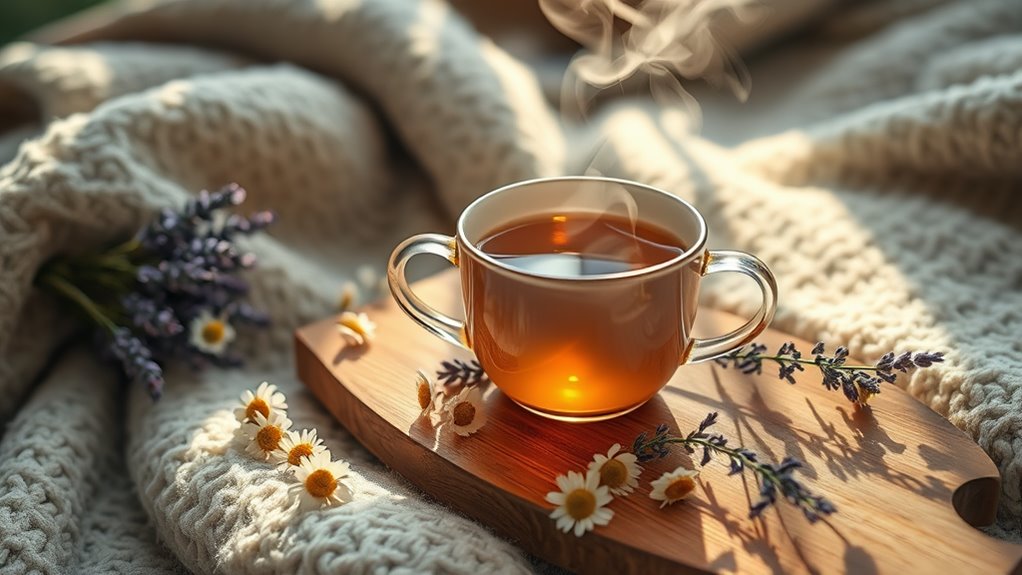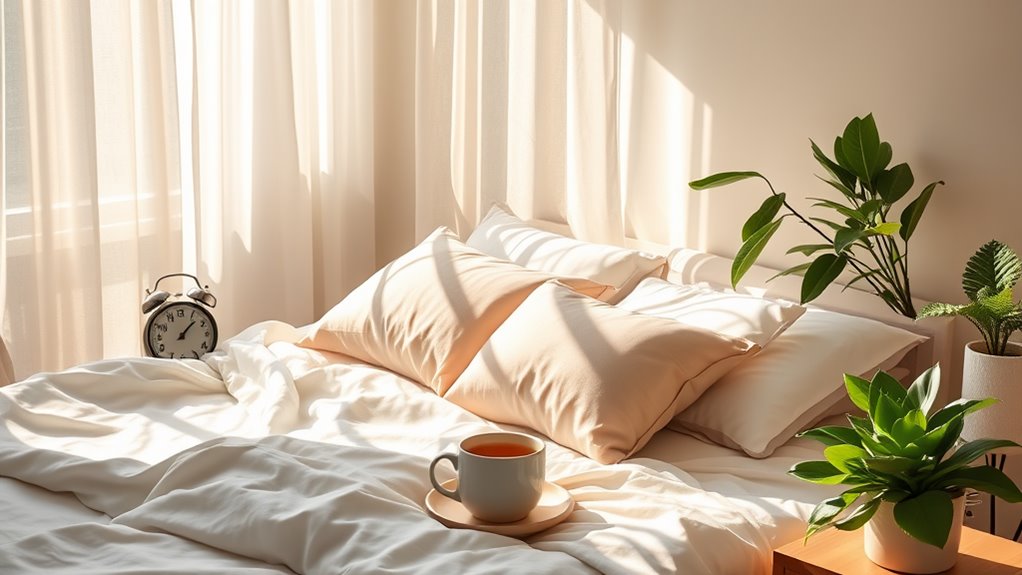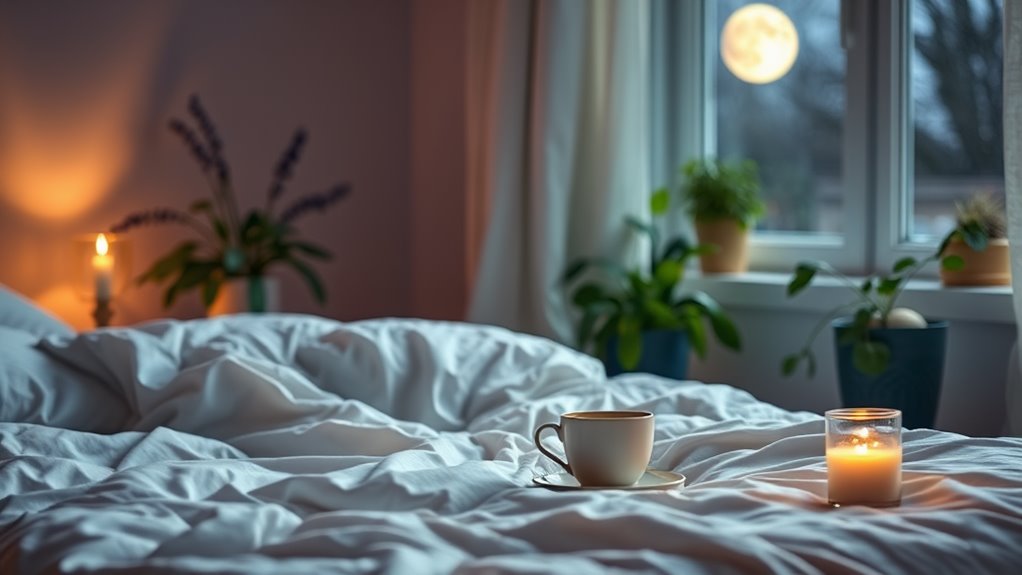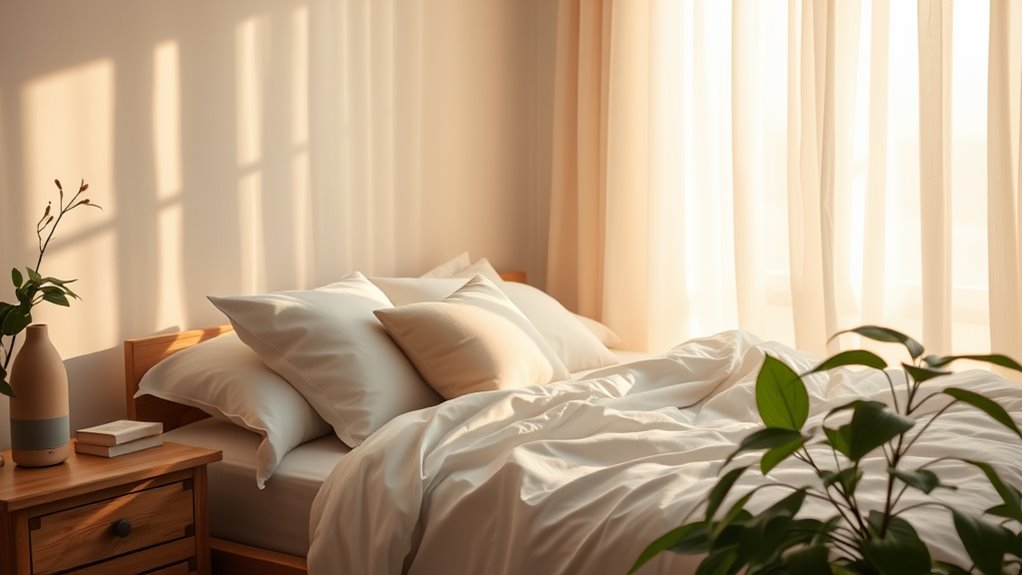This Tea Helps You Unwind and Fall Asleep Naturally
You’ll find that herbal teas like chamomile and lavender help you unwind and fall asleep naturally, thanks to their natural compounds that lower anxiety and cortisol levels, as shown in clinical studies. Brew a simple cup 30-60 minutes before bed to ease tension and boost sleep quality. Explore these blends further for practical tips and recipes that make restful nights even easier.
Key Takeaways
- Chamomile tea promotes relaxation and sleep by interacting with GABA receptors to reduce anxiety.
- Valerian root in herbal tea improves sleep onset and quality by influencing neurotransmitters naturally.
- Lavender enhances tea’s calming effects, helping to ease tension and prepare for rest.
- Brew herbal blends like chamomile 30-60 minutes before bed for optimal unwinding benefits.
- Pair sleep-promoting teas with a consistent routine, such as dimming lights, to boost natural relaxation.
Benefits of Herbal Teas for Relaxation
Herbal teas, like chamomile and lavender, offer proven benefits for relaxation by containing natural compounds that ease anxiety and promote calm. Additionally, these teas often include adaptogenic herbs that support the body’s ability to manage chronic stress.
When you incorporate bedtime tea into your evening routine, you’re actively reducing stress to improve sleep quality. Evidence from clinical studies shows these teas lower cortisol levels, helping you unwind faster and achieve deeper rest.
You’ll notice quicker sleep onset and fewer disturbances, as bedtime tea supports your body’s natural wind-down process. For practical use, brew a cup of caffeine-free herbal tea about 30-60 minutes before bed in a calm setting.
This simple habit, backed by research on relaxation responses, makes bedtime tea an effective, natural tool for enhancing your overall sleep. By prioritizing this ritual, you’re investing in restorative nights that boost daily energy and well-being.
To further enhance relaxation, consider combining herbal teas with the 4-7-8 breathing method for even deeper sleep benefits.
Key Ingredients in Sleep-Promoting Blends
When you delve into sleep-promoting blends, key ingredients like chamomile and valerian root work actively to enhance relaxation by targeting the body’s stress response. You’ve likely noticed chamomile’s calming effects, supported by research showing it reduces anxiety through GABA receptor interactions. Valerian root aids deeper sleep by influencing neurotransmitters, as evidenced in clinical studies. Other ingredients, such as passionflower, offer practical benefits by easing tension naturally. Combining these herbal blends with mindful breathing techniques can provide additional support for managing anxiety and improving overall sleep quality. Incorporating these blends can promote restorative rest by supporting longer periods of quality sleep, as backed by scientific techniques.
| Ingredient | Primary Benefit | Scientific Evidence |
|---|---|---|
| Chamomile | Promotes relaxation and sleep | Studies in Journal of Ethnopharmacology show anxiety reduction. |
| Valerian Root | Improves sleep onset and quality | Research in Sleep Medicine indicates sedative properties. |
| Passionflower | Reduces restlessness | Clinical trials in Phytomedicine confirm calming effects. |
Simple Recipes for Bedtime Tea
Building on the ingredients we’ve covered, you can whip up simple bedtime teas at home to harness their sleep benefits.
Start with a chamomile infusion: measure one teaspoon of dried chamomile into a cup of boiling water, steep for 5-10 minutes, then strain. A study in the Journal of Clinical Sleep Medicine shows chamomile’s apigenin reduces anxiety and promotes deeper sleep.
For a valerian blend, combine half a teaspoon of valerian root with your chamomile before steeping. Evidence from the Cochrane Database indicates valerian enhances sleep quality by increasing GABA levels in the brain.
Add a twist with lavender: include a quarter teaspoon of dried lavender buds in either recipe. Research in Evidence-Based Complementary and Alternative Medicine links lavender to lowered heart rate and better relaxation.
Always use fresh, high-quality ingredients for optimal potency, and enjoy your tea 30-60 minutes before bed. For even better results, consider optimizing your sleep environment to complement these teas.
To enhance these sleep aids, consider incorporating the 4-7-8 method into your routine for a more profound relaxation response.
Ways to Incorporate Tea Into Your Routine
To seamlessly weave tea into your daily routine, start by setting a specific time each evening for brewing and sipping, such as right after dinner, which research in the journal Sleep shows can signal your body to wind down and improve overall sleep patterns.
Next, select a simple brewing method that fits your lifestyle, like using a quick infuser or pre-made bags to save time. You’re more likely to stick with it if you experiment with flavors that appeal to you, making tea an enjoyable habit rather than a chore.
Keep supplies organized in one spot for easy access, as behavioral studies from the Harvard Business Review suggest that minimizing friction boosts routine adherence.
Pair your tea time with existing activities, like reading or light stretching, to naturally integrate it without added effort. This approach builds consistency, turning tea into a reliable daily ritual that enhances your evenings.
Tips for Enhancing Sleep With Natural Teas
Natural teas like chamomile and valerian root can significantly improve your sleep quality, as studies in the Journal of Clinical Sleep Medicine confirm their ability to reduce anxiety and promote relaxation.
To maximize benefits, brew a cup 30-60 minutes before bed; this timing allows compounds to take effect without disrupting your routine. Experiment with blends, such as adding lavender for extra calm, and avoid caffeine after noon to prevent interference.
Steep leaves in hot water for 5-10 minutes to extract full potency, and sip slowly in a quiet space. Combine this with consistent sleep hygiene, like dimming lights, to enhance results—research from Sleep Health journal shows routines boost tea’s efficacy.
Track your progress; if you notice deeper rest, maintain the habit for long-term gains. Always consult a doctor if sleep issues persist.





